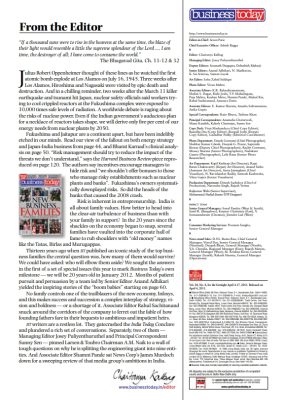New Business Families
[Business Today]
Published date: 17th Apr 2011
“If a thousand suns were to rise in the heavens at the same time, the blaze of their light would resemble a little the supreme splendour of the Lord…. I am time, the destroyer of all; 1 have come to consume the world.”
The Bhagavad Gita, Ch. 11-12 & 32
Julius Robert Oppenheimer thought of these lines as he watched the first atomic bomb explode at Los Alamos on July 16, 1945. Three weeks after Los Alamos, Hiroshima and Nagasaki were visited by epic death and destruction. And in a chilling reminder, two weeks after the March 11 killer earthquake and tsunami hit Japan, nuclear safety officials said workers trying to cool crippled reactors at the Fukushima complex were exposed to 10.000 times safe levels of radiation. A worldwide debate is raging about the risks of nuclear power. Even if the Indian government’s audacious plan for a necklace of reactors takes shape, we will derive only five per cent of our energy needs from nuclear plants by 2050.
Fukushima and Jaitapur are a continent apart, but have been indelibly etched in our minds. Read our view of the fallout on both energy strategy and Japan-India business from page 44, and Bharat Karnad’s clinical analysis on page 50. “Risk management should try to reduce the impact of the threats we don’t understand,” says the Harvard Business Review piece reproduced on page 120. The authors say incentives encourage managers to hide risk and “we shouldn’t offer bonuses to those who manage risky establishments such as nuclear plants and banks”. Fukushima’s owners systematically downplayed risks. So did the heads of the banks that caused the 2008 crash.
Risk is inherent in entrepreneurship. India is all about family values. How better to head into the clear-air turbulence of business than with your family in support? In the 20 years since the shackles on the economy began to snap, several families have vaulted into the corporate hall of fame to rub shoulders with “old money” names like the Tatas, Birlas and Murugappas.
Thirteen years ago when BT published an iconic study of the top business families the central question was, how many of them would survive? We could have asked: who will elbow them aside? We sought the answers in the first of a set of special issues this year to mark Business Today’s own milestone-we will be 20 years old in January 2012. Months of patient pursuit and persuasion by a team led by Senior Editor Anand Adhikari yielded the inspiring stories of the “boom babies” starting on page 60.
No family controls one of the trailblazers of the new economy. Infosys. and this makes success and succession a complex interplay of strategy, vision and boldness or a shortage of it. Associate Editor Rahul Sachitanand snuck around the corridors of the company to ferret out the fable of how founding fathers fare in their bequests to ambitious and impatient heirs.
BT writers are a restless lot. They gatecrashed the India Today Conclave and plundered a rich set of conversations. Separately, two of them- Managing Editor Josey Puliyenthuruthel and Principal Correspondent Sunny Sen pinned Larsen & Toubro Chairman A.M. Naik to a wall of tough questions on why he is splitting the engineering giant into nine entities. And Associate Editor Shamni Pande sat News Corp’s James Murdoch down for a sweeping review of that media group’s ambitions in India.






